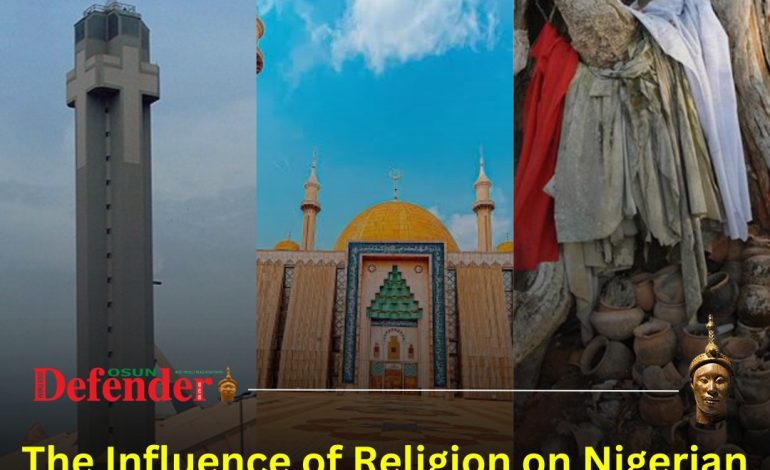The Influence Of Religion On Nigerian Politics

Religion has always played a pivotal role in shaping the political landscape of Nigeria. As a country deeply rooted in religious diversity, with Islam and Christianity being the dominant faiths alongside traditional beliefs, the intersection of religion and politics has become an inevitable phenomenon. Over the years, this intersection has influenced policymaking, governance, and electoral processes, often sparking debates about its positive and negative implications on national unity and development.
The relationship between religion and politics in Nigeria is a complex one, as the two spheres often overlap in ways that affect the nation’s socio-political fabric. Politicians have been known to exploit religious sentiments to garner support, while religious leaders, in turn, wield significant influence over their followers in shaping political opinions. This symbiotic relationship underscores the undeniable power religion holds over the nation’s political decisions and directions.
While some argue that religion serves as a moral compass in governance, others believe its involvement in politics has led to division and heightened tensions among the populace. This has been evident in the recurring instances of religious bias in appointments, policies, and resource distribution. Such realities have not only deepened mistrust but also highlighted the delicate balance required to ensure inclusivity in a pluralistic society like Nigeria.
As the nation continues to navigate its political challenges, Osun Defender critically examines how religion has influenced and continues to shape political decisions. This analysis will not only provide insights into the underlying factors driving the interplay of religion and politics but also offer a framework for fostering a more cohesive and inclusive governance structure.
1. Religion as a Tool for Political Mobilization
In Nigeria, religion has often been used as a powerful tool for political mobilization. Politicians frequently align themselves with religious institutions and leaders to gain the trust and support of voters. Campaigns are sometimes conducted in mosques, churches, and other religious settings, with promises tailored to appeal to the faith-based sentiments of the electorate. For instance, during election periods, candidates often highlight their religious affiliations to gain the favor of specific demographics.
This trend is particularly evident in the endorsement of candidates by prominent religious leaders. Such endorsements can sway public opinion significantly, as many Nigerians view their religious leaders as moral authorities. While this strategy has proven effective in mobilizing voters, it has also contributed to the politicization of religion, where religious groups become divided along political lines. This division often leads to heightened tensions and, in some cases, violence, as seen in certain parts of the country during elections.
Moreover, the use of religion for political gain raises questions about the sincerity of political actors. Many politicians adopt religious rhetoric not out of genuine belief but as a means to an end. This undermines the credibility of both politics and religion, as it turns sacred spaces into arenas for political propaganda. Such practices erode public trust in institutions and perpetuate a cycle of exploitation that hinders national progress.
To address this, there is a need for a clear separation between religious institutions and political activities. While religion can guide moral values, its excessive involvement in politics often leads to polarization and undermines the democratic process.
2. Religious Influence on Policy Decisions
Religion significantly impacts policy decisions in Nigeria, particularly in areas such as education, healthcare, and social justice. Policymakers often consider religious sentiments when drafting laws or implementing programs, sometimes to the detriment of national interest. For example, debates around the adoption of a uniform civil code or issues like abortion and same-sex marriage are deeply influenced by religious ideologies.
In many cases, religious groups lobby for policies that align with their beliefs, exerting pressure on political leaders to prioritize their agendas. This influence is most evident in regions where one religion dominates, leading to policies that may marginalize other faiths. For instance, the implementation of Sharia law in some northern states has sparked debates about the constitutional principle of secularism and its implications for national unity.
On the other hand, religious influence can also have positive outcomes. Many faith-based organizations advocate for social justice, poverty alleviation, and human rights, pushing governments to adopt policies that benefit the masses. However, the challenge lies in ensuring that such advocacy does not exclude or discriminate against other groups.
To strike a balance, Nigeria must adopt a more inclusive approach to policymaking, where decisions are based on the collective good rather than religious biases. This will require political leaders to prioritize national interests over sectarian pressures.
3. Religious Bias in Political Appointments
One of the most contentious issues in Nigerian politics is the perception of religious bias in appointments to key government positions. Over the years, successive administrations have faced accusations of favoring one religion over another, leading to feelings of marginalization and mistrust among citizens.
Such biases are often evident in the distribution of ministerial positions, security appointments, and other top roles in government.
For example, if a president is of a particular faith, there is often an expectation that appointments will reflect a balance between the major religions to maintain national cohesion. When this balance is perceived to be absent, it fuels agitation and sometimes leads to protests or calls for restructuring. The impact of religious bias in appointments extends beyond governance. It also affects the quality of service delivery, as competence may be sacrificed for religious considerations. This not only undermines meritocracy but also weakens public institutions, as appointments are made based on loyalty rather than ability.
To address this issue, there is a need for a transparent and merit-based system of appointments that prioritizes competence over religious affiliations. Such a system will foster inclusivity and restore public confidence in government institutions.
4. Religious Conflicts and Political Stability
The interplay between religion and politics has often been a source of conflict in Nigeria, threatening the nation’s political stability. Religious crises, fueled by political manipulation, have led to the loss of lives and property, especially in regions with a history of ethno-religious tensions. Politicians sometimes exploit these divisions to achieve their goals, further deepening the divide between communities.
For instance, clashes between Christian and Muslim communities during election periods are often rooted in political rivalries disguised as religious disputes. These conflicts not only disrupt the electoral process but also leave lasting scars on affected communities, making reconciliation difficult.
READ ALSO
•Court Remands #EndSARS Activist For Criticising Seyi Tinubu
•Adeleke Directs Pardon For Man Sentenced To Death For Stealing Fowl
The economic cost of religious conflicts is equally staggering, as resources that could have been used for development are diverted to address security challenges. This vicious cycle of conflict and underdevelopment highlights the urgent need for proactive measures to address the root causes of religious tensions in Nigerian politics.
Efforts to promote interfaith dialogue and understanding should be prioritized to foster unity among Nigerians. Political leaders must also desist from using religion as a tool for division and instead focus on policies that promote coexistence and national development.
5. The Need for Secularism in Governance
Given the challenges posed by the influence of religion on Nigerian politics, there is a growing call for a more secular approach to governance. While Nigeria is constitutionally a secular state, the reality often contradicts this principle, as religious considerations frequently overshadow national interests.
Secularism does not imply the absence of religion but rather the equal treatment of all religions without favor or discrimination. Adopting this principle will ensure that political decisions are made objectively, free from religious biases. It will also create a level playing field for all citizens, regardless of their faith, and promote inclusivity in governance.
To achieve this, political leaders must uphold the constitutional provisions that guarantee freedom of religion and the separation of religion and state. Religious leaders, on their part, should focus on their spiritual mandates and avoid becoming entangled in partisan politics.
By embracing secularism, Nigeria can address many of the issues stemming from the intersection of religion and politics. This will not only strengthen democratic institutions but also foster unity and development in the country.

Sodiq Lawal is a passionate and dedicated journalist with a knack for uncovering captivating stories in the bustling metropolis of Osun State and Nigeria at large. He has a versatile reporting style, covering a wide range of topics, from politics , campus, and social issues to arts and culture, seeking impact in all facets of the society.









